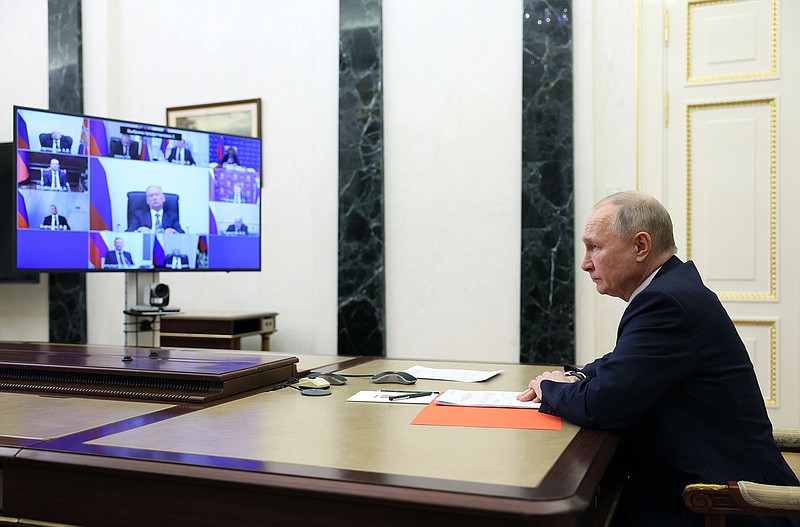The war crimes charges against Vladimir Putin brought by the International Criminal Court mean that the Russian leader, in theory, is unable to travel to two-thirds of the globe without risking arrest in the 123 countries that are parties to the United Nations treaty underpinning the court’s operations and therefore obligated to detain him.
In practice, the situation is more complex — with some ICC member states condemning the arrest warrant, and others having set a precedent of flouting the court’s orders.
Already, the ICC’s arrest warrant, which accuses Putin, along with his children’s rights commissioner, of illegally deporting Ukrainian children to Russia, may be weighing on the Kremlin’s travel plans.
Kremlin spokesman Dmitry Peskov told reporters on Friday that “no decision has yet been made” on whether Putin will travel to Durban, South Africa, in August for a planned summit with Cyril Ramaphosa, the country’s president, as well as the leaders of Brazil, India and China.
Johannesburg, which historically has enjoyed a close relationship with Moscow, is reportedly seeking legal advice on the matter. A spokesman for Ramaphosa, Vincent Magwenya, told reporters: “We as the government are cognizant of our legal obligation. However, between now and the summit we will remain engaged with various relevant stakeholders.” South Africa, however, already has a checkered history with the International Criminal Court, and was condemned by the international court as well as a South African court for not arresting Sudanese leader Omar Hassan al-Bashir in 2015 even though he had been charged with genocide. The South African government allowed al-Bashir to leave the country, where he had attended an African Union meeting, by private plane, defying court orders.
On several occasions in recent years, South Africa has also voiced its intention to withdraw from the ICC.
Putin is already isolated on the international stage because of his war in Ukraine, and he has not traveled to what the Kremlin deems “unfriendly countries” since the start of the invasion in February 2022. It is highly unlikely that he would travel to any of the 123 ICC member states in the near future.
Peskov has called the warrant “outrageous and unacceptable” but also “null and void” as far as Moscow is concerned because Russia is not a party to the International Criminal Court.
But other countries have applauded the court’s decision.
This week, German Justice Minister Marco Buschmann said that his country would arrest Putin. “Germany will be obliged to arrest President Putin if he enters German territory and hand him over to the International Criminal Court,” Buschmann told Die Zeit, a national newspaper.
The French Foreign Ministry tweeted: “No one responsible for crimes committed by Russia in Ukraine, regardless of their status, should escape justice.” And Britain’s foreign secretary, James Cleverly, tweeted last week that “those responsible for horrific war crimes in Ukraine must be brought to justice.” Cleverly said the U.K. “welcomed” the step taken by the ICC.
In addition to the summit in Durban, Putin might normally be expected to attend the Group of 20 leaders’ summit, scheduled for September in New Delhi. India is not an ICC member state so the trip may be possible, but Putin did not attend last year’s G-20 meeting in Bali, Indonesia, amid speculation that some leaders might leave rather than sit with him.
Putin has often attended the annual Asia-Pacific Economic Cooperation summit, but this year the meeting will take place in November in San Francisco. While the United States is not an ICC member state, Putin is under U.S. sanctions and President Joe Biden has spoken out in favor of the arrest warrant, saying “it’s justified.” Putin is expected to visit China later this year after the country’s president, Xi Jinping, invited him to Beijing during a three-day state visit to Moscow this week. China is not a party to the ICC.
Putin can also safely visit some ex-Soviet countries, including Belarus, Kazakhstan and Uzbekistan. And he can travel to Iran, which has emerged as a key ally, supplying the Russian army with self-detonating Shahed drones.
The ICC does not have its own police force and must rely on individual nations to enforce its arrest warrants.
Former Russian President Dmitry Medvedev, who is now the deputy head of Russia’s security council, has said that arresting Putin would be “a declaration of war.” Medvedev threatened to bomb any country that did so.
Hungary, which is a member of the ICC, said Thursday that it would not arrest Putin. Hungarian Prime Minister Viktor Orban has maintained good ties with Putin and has called on Ukraine to negotiate an end to the war.
Serbia, an ICC member and close ally of Russia, has also condemned the warrant.
South Africa is not the only country that has ignored its ICC obligations in the past. At least nine member countries — including Jordan, Kenya, Nigeria and Uganda — allowed al-Bashir to travel on their territory without being detained, despite two arrest warrants.
There have also been some surprising reactions to the warrant against Putin. Armenia’s Constitutional Court issued a ruling on Friday indicating that the country must act on the arrest warrant. Armenia, traditionally a close Russian ally and a member of the Collective Security Treaty Organization — an alliance of former Soviet states — signed the ICC treaty, known as the Rome Statute, in 1998 but never ratified it because of a previous Constitutional Court ruling.
Austria’s justice minister, Alma Zadic, issued a statement voicing commitment to the ICC. “Austria will continue to do everything possible to bring justice to the people of Ukraine,” Zadic said in the statement. “This also includes our continued support for the International Criminal Court in this case.” And Brazil’s foreign minister, Mauro Vieira, told national media this week that Brazil had no official position on the warrant, but acknowledged that Brazil is obligated to respect ICC decisions.
